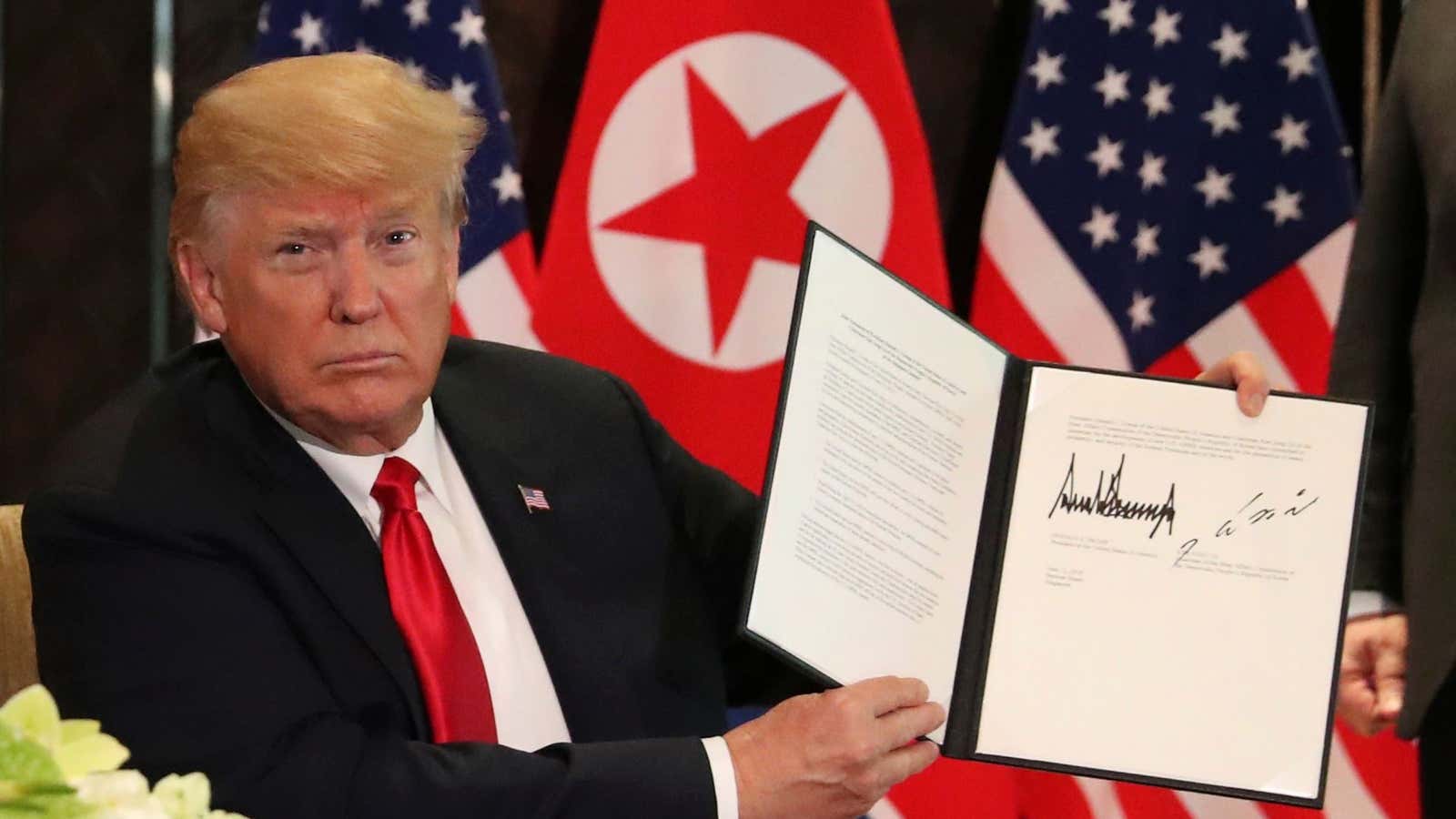After the historic summit today between US president Donald Trump and North Korean leader Kim Jong Un, there’s one clear winner: China. The plan outlined in the two leaders’ joint statement turns out to be exactly what Beijing wants.
After shaking hands, meeting one-on-one and in a group, and a working lunch with vanilla ice cream, the two leaders signed a document this afternoon asserting that Washington would provide “security guarantees” to Pyongyang in exchange for the rogue regime’s “unwavering commitment to complete denuclearization of the Korean peninsula.”
At a solo press conference hours after the signing, Trump spelled out what kind of security guarantees he was talking about. Answering a series of questions from the floor, Trump said that the US will stop “war games” in South Korea, and later elaborated that he was speaking of their joint military exercises, held annually since the 1970s. Trump described the drills as “provocative” and “inappropriate.” He said:
The war games are very expensive, we pay for a big majority of them. We fly in bombers from Guam… to practice and drop bombs all over the place and then go back to Guam. I know a lot about airplanes. It’s very expensive.
… So under the circumstances that we’re negotiating, a very comprehensive complete deal, I think it’s inappropriate to be having war games. So number one we save money, a lot, and number two, it really is something that I think they [North Korea] very much appreciate.
That’s a big concession to make, and one that caught many people by surprise. Shortly after Trump’s presser, a spokesperson from South Korea’s Blue House (its executive branch of government) said that “the meaning and intention” of the US president’s remarks regarding the war games “require more clear understanding.” The US forces in South Korea, meanwhile, told Stars and Stripes magazine that it had not received updated guidance on cessation of training exercises, and “will continue with our current military posture until we receive updated guidance.”
The US and South Korea suspending their military exercises in exchange for the North stopping its missile launches and nuclear tests is the exact situation China wants to see on the peninsula. The proposal—called “dual suspension” or “suspension for suspension” by China, and sometimes referred to by analysts as “freeze for freeze”—was introduced by Beijing about a year ago, and has since been prominently promoted on the global stage. Some analysts quickly noted that Trump seems to have played into Beijing’s hands:
The US has long held the view that North Korea’s illegitimate military activities can’t be traded away for its right to do legitimate military activities. Less than a year ago, Robert Wood, the US ambassador to the United Nation’s Conference on Disarmament, made the following remarks, criticizing the rationale for China’s dual-suspension proposal:
We firmly reject any false equivalency between North Korea’s illegal nuclear and missile programs, which are enormously destabilizing and have been repeatedly condemned by the UN Security Council, and our long-standing joint activities with our allies, which are transparent and defensive in nature.
Many North Korea watchers have noted that the Singapore summit agreement lacks substance, despite Trump touting it as “very comprehensive.” For one thing, North Korea’s commitment on “complete denuclearization” is simply a repeat of its previous promise from the inter-Korean summit in April, and it lacks a clear definition.
Trump downplayed Beijing’s role in the denuclearization process. He said the US is working on the issue with South Korea, and Japan—as well as with China, but “to a lesser extent.” He added he would likely call Chinese president Xi Jinping “very shortly” about the summit.
A statement from Beijing today indicated its satisfaction with the outcome. “The United States and North Korea have been in a state of antagonism for more than half a century,” China’s foreign minister told reporters in Beijing after the Trump-Kim summit. “Today, that the two countries’ highest leaders can sit together and have equal talks, has important and positive meaning, and is creating a new history. China of course supports it.”




